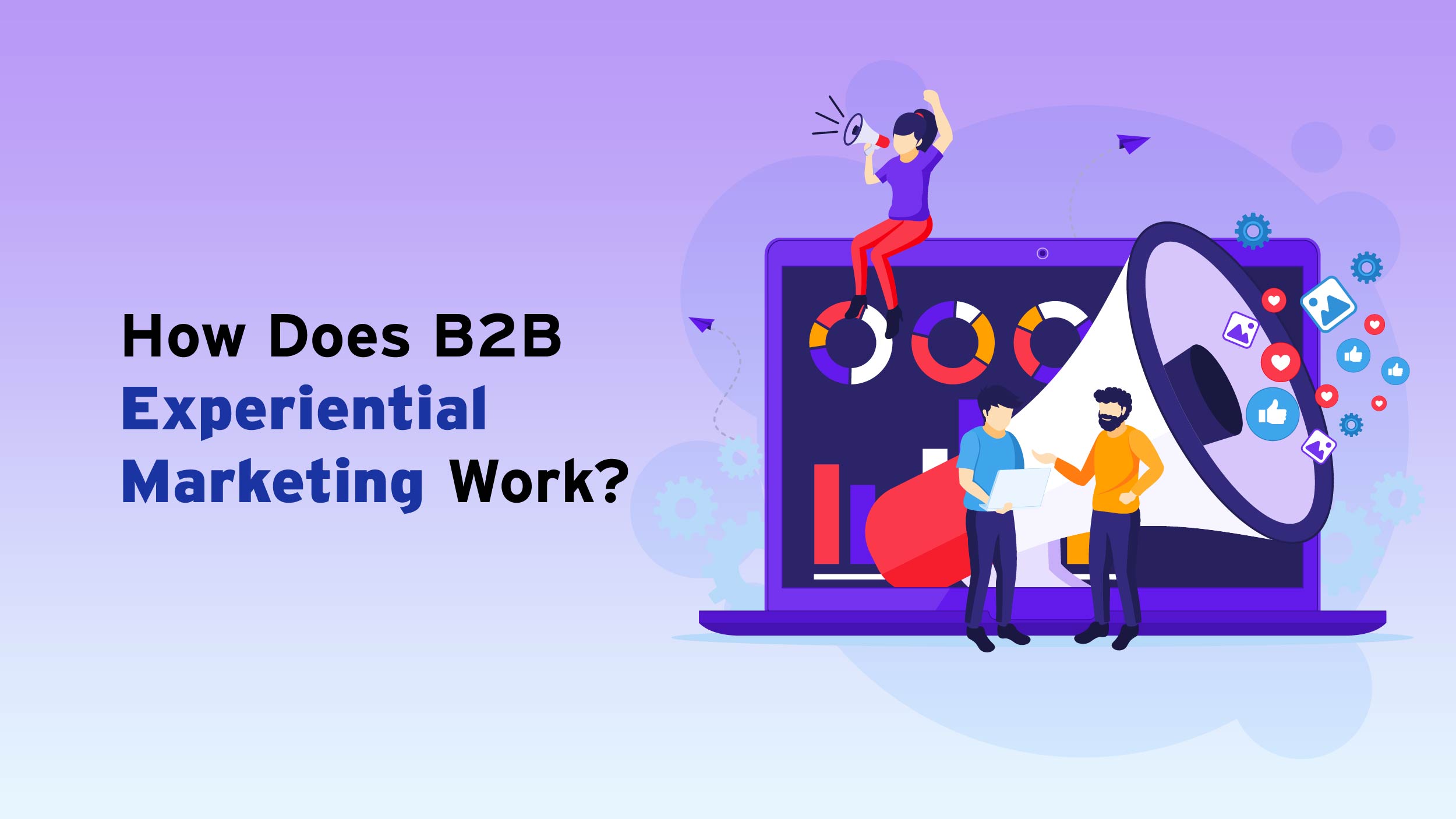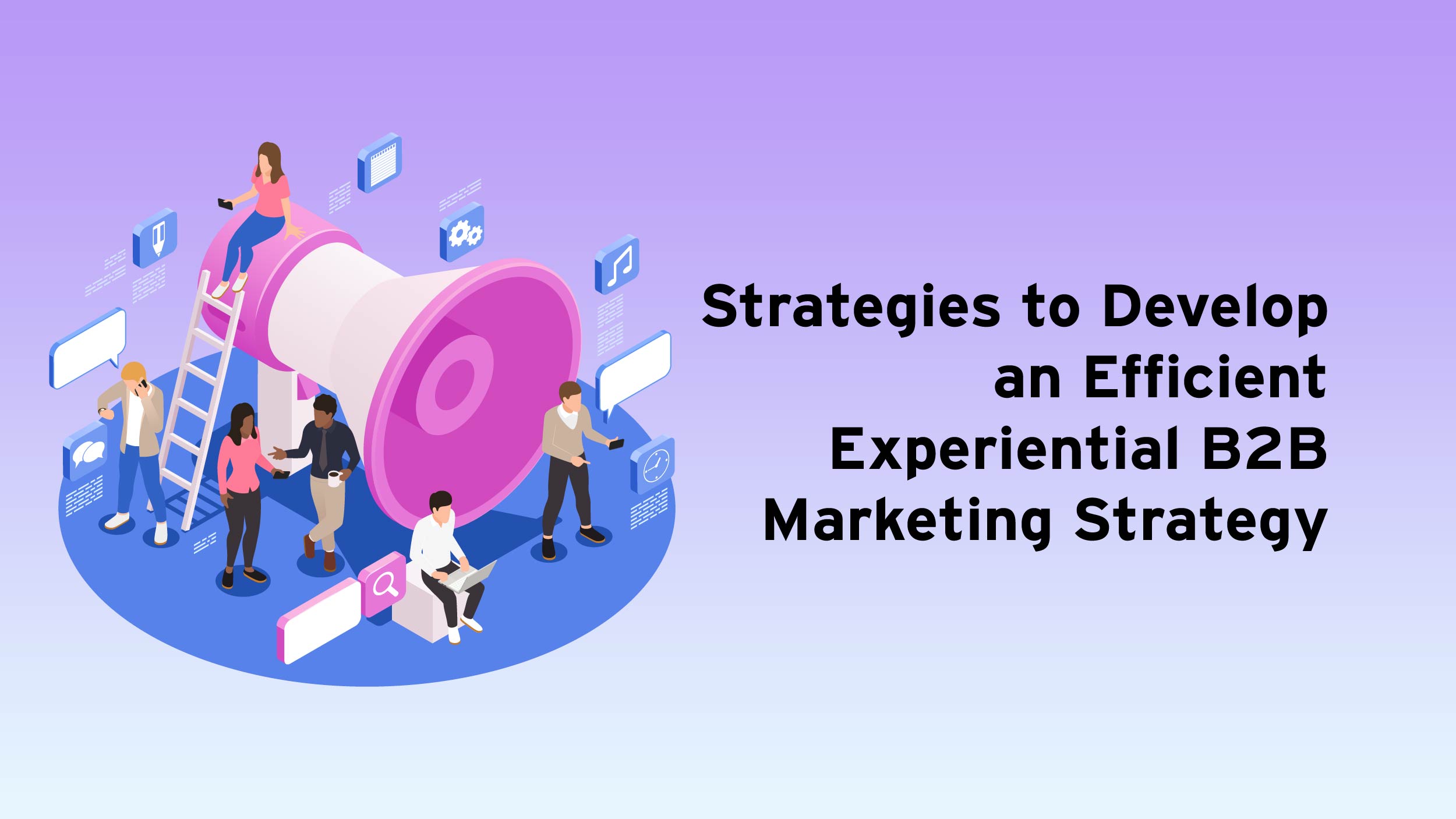Most B2B marketers think marketing is a one-way street. B2B organizations rely on multiple trade shows, exhibitions, & conferences to increase their brand awareness and have healthy competition with their competitors. Companies get their brand kits, brochures, & the top marketing resources to gain traction for their brand. However, they fail to get the desired impact from participating in these marketing gimmicks.
B2C businesses are already gaining the benefits of experiential marketing. If used strategically, it can also be a powerful tool for B2B marketers. In the end, the decision-makers in the big enterprises are people like us. They also like engaging, interactive, and fun experiences while learning about the organization.
Let us have a look at how B2B experiential marketing works and what the strategies are to develop one.
What is Experiential Marketing?
Engagement marketing and ground marketing are various names for experiential marketing (XM). It is a pre-sales approach designed to interact and engage with prospects. This marketing strategy can be included in the current campaigns or executed as a separate experiential activation.
Experiential marketers are skilled professionals who can design and execute such pre-sales campaigns. They have expertise in drafting marketing strategies that drive brand awareness and offer customer experiences that lure clients to engage or participate to leave a strong brand impression.
How Does B2B Experiential Marketing Work?
 If executed in the appropriate way, experiential marketing will have a tremendous impact on the sales of any organization. It has a long-lasting impact on the audience and helps engage them effectively.
If executed in the appropriate way, experiential marketing will have a tremendous impact on the sales of any organization. It has a long-lasting impact on the audience and helps engage them effectively.
Clients who interact with your brand during an experiential activation campaign will most likely remember your brand and try your products or services instead of other lesser-known vendors.
This marketing strategy can help B2B marketers create and seize opportunities to develop and promote their brands with exclusive original content. It helps enhance the reach by boosting brand awareness.
According to a report by Freeman Data, almost 76% of B2B marketers state that experiential and event marketing strategies help them increase brand awareness.
Also Read: Personalized Customer Engagement: 9 Ways for Improved Conversion Rate
Strategies to Develop an Efficient Experiential B2B Marketing Strategy
 Experiential marketing strategies enable marketers to deliver customized brand experiences by interacting with and educating potential customers to build deeper connections. Many organizations are exploring opportunities to increase their marketing budgets to include experiential brand activations. Despite the huge funding, if the marketers are not unable to deliver an outstanding, memorable experience, all the investments will be in vain.
Experiential marketing strategies enable marketers to deliver customized brand experiences by interacting with and educating potential customers to build deeper connections. Many organizations are exploring opportunities to increase their marketing budgets to include experiential brand activations. Despite the huge funding, if the marketers are not unable to deliver an outstanding, memorable experience, all the investments will be in vain.
In order to deliver memorable experiences, marketers need to eliminate the idea that the booth space exists to simply deliver information. It is crucial to craft and deliver a fun, engaging, and unique brand experience.
Following are a few strategies that pre-sales teams of B2B organizations can consider to develop an experiential marketing strategy that works:
Gamification
One of the most effective ways to deliver a top-notch experience is through gamification. Simply installing prize wheels or raffles to attract and engage the prospects will not do the work. Modern marketers can take a step ahead by crafting games that educate and entertain the audience. Integrating technology, gamification, and a sales pitch in one experience will leave a long-lasting impression on the customers. The aim of experiential marketing should be to engage the customers in the game while delivering a sales pitch.
Trade Shows, Conferences, and Events
Many marketers find it challenging to stand apart from their competitors on the same floor. In this case, B2B organizations should eliminate the middleman and organizers to conduct their own trade show delivering a truly immersive experience. Compared to the traditional event, where marketing reps have very little time to interact with each customer, company-organized events allow in-depth conversations to showcase to clients what they have to offer.
Taking Marketing Activities to Customers
Small businesses that do not have the budgets to fund their own events or make an impression at other trade shows, can explore other experiential activation strategies. They should interact directly with the customer, offering a customized experience to showcase the product’s USPs in a controlled and competition-free environment.This experiential marketing strategy allows you to engage with the key decision-makers rather than focusing on standing apart from the competition.
Attract, Hire, and Retain the Top Marketing Talent
The success of any marketing campaign depends on the people who design and execute it. Businesses need to attract, hire, and retain the best marketing talent to ensure success.
Training Marketing Talent
Training the pre-sales staff is one of the most essential steps to ensure success. If the pre-sales team is not well-versed with the product they are marketing, how can they sell the product? B2B organizations can try the experiential marketing strategies on the internal team first to understand its impact and take necessary feedback. The experiential training approach is an effective way to train resources.
Engage Pre-sales Team
After the marketing teams are hired and trained, it is crucial to keep them engaged and motivated about promoting the products. Marketing resources always need to be motivated to deliver high productivity.B2B organizations need to offer a better working environment to ensure the marketing messages are forwarded with the same conviction.
In Conclusion
Delivering engaging experiences and live marketing is an ideal way to reach and expand your target audience. Today’s B2B consumers also expect more engaging and customized brand interactions. Experiential marketing can create endless opportunities for any B2B organization. Irrespective of the experiential activation strategy marketers select, it should be memorable, measurable, and shareable. Pre-sales teams can stay on top of the latest marketing trends to leave a long-lasting impression and position their brand as an industry leader.


Comments are closed.